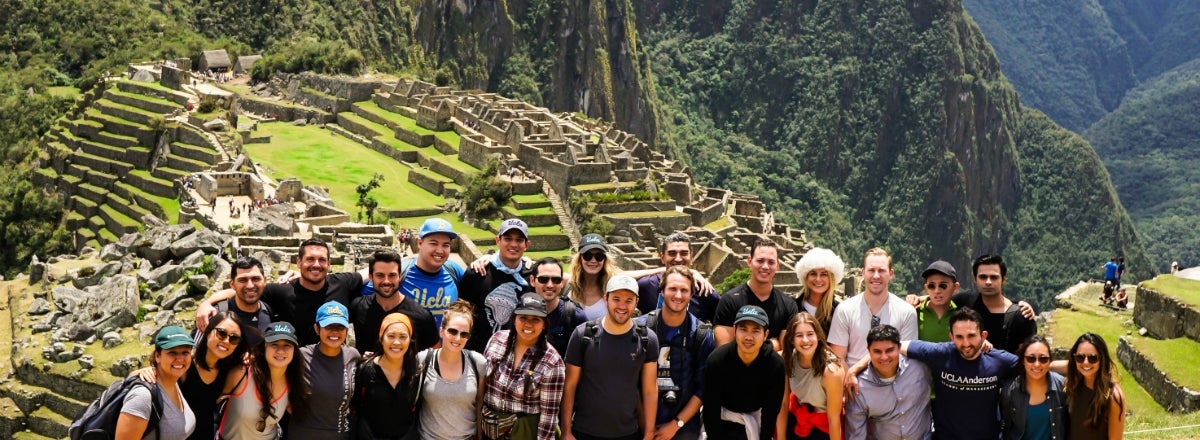Fully Employed MBA Academics
Options to Meet Your Needs
Student Perspectives

“FEMBA impacted my career immediately. I became a Senior Architectural Associate halfway through the first year of the program. I was naturally taking concepts and perspectives from the classroom directly to my new role, and also able to better create innovative strategies while making purposeful decisions.”
Jessica Ta
FEMBA '19
Senior Architectural Associate, UCLA Housing and Hospitality Services
Curriculum
*Total academic units subject to change based on annual curriculum review and updates.
First Year
Summer
- Leadership Module: Mandatory 1-week on-campus intensive typically held the last week of August incorporating first official course
*Foundations of Inclusive Leadership
Fall
- Data & Decisions
- Managerial Economics
Winter
- Organizational Behavior
- Marketing Management
Spring
- Financial Accounting
- Foundations of Finance
Second Year
Summer
- Elective
- Elective
Fall
- Business Strategy
- Elective
Winter
- Operations & Technology Management
- Elective
Spring
- *Foundations of Ethical Decision Making
- *Global Economics & Business Cycles
- *Elective
- Elective
Third Year
Summer
- Capstone Project: Global Access Program or Business Creation Project
- Elective
Fall
- Capstone Project: Global Access Program or Business Creation Project
- Elective
On the second and third years, one-week Global Immersion or International Exchange optional electives, are available between quarters, in more than 20 different countries.
*Denotes 2 unit course. Most courses are 4 units.
First Year
Summer
- Leadership Module: Mandatory 1-week on-campus intensive typically held the last week of August incorporating first official course
*Foundations of Inclusive Leadership
Fall
- Data & Decisions
- Managerial Economics
Winter
- Organizational Behavior
- Marketing Management
Spring
- Financial Accounting
- Foundations of Finance
Second Year
Fall
- Business Strategy
- Elective
Winter
- Operations & Technology
- Elective
Spring
- *Foundations of Ethical Decision Making
- *Global Economics & Business Cycles
- Elective
Third Year
Summer
- Capstone Project: Global Access Program or Business Creation Project
- Elective
Fall
- Capstone Project: Global Access Program or Business Creation Project
- Elective
Winter
- Elective
- Elective
Spring
- Elective
- Elective
FEMBA Offers Three Flexible Schedule Options to Complete the Core Portion of the Program.
Course 1
9:30 a.m. – 12:45 p.m.
Course 2
2:00 p.m. – 5:15 p.m.
Course 1
Tuesdays 6:30 p.m. – 9:45 p.m.
Course 2
Thursdays 6:30 p.m. – 9:45 p.m.
4 weekends per quarter
on-campus, the rest online
Core Course Requirements
| Course Info | Description |
|---|---|
| Year/Qtr: 1/Fall Unit: 2 Course ID: 401 |
Foundations of Inclusive Leadership Managing and working with people, with emphasis on motivation and development of individuals, leadership and interpersonal relationships, and group dynamics in complex organizational settings. Woven into five-day Leadership Module residential. |
| Year/Qtr: 1/Fall Unit: 4 Course ID: 402 |
Data & Decisions Topics include probabilities, random variables (expectation, variance, covariance, normal random variables), decision trees, estimation, hypothesis testing, and multiple regression models. Emphasis on actual business problems and data. |
| Year/Qtr: 1/Fall Unit: 4 Course ID: 405 |
Managerial Economics Designed for graduate students. Analysis of consumer, producer, and market behavior. Market structure, pricing, and resource allocation. Applications to managerial strategy and public policy, with emphasis on competition, market power, and externalities. |
| Year/Qtr: 1/Winter Unit: 4 Course ID: 409 |
Organizational Behavior Introduction to human resource management function and management of human behavior in organizations. Emphasis on relationships among individuals, groups, and organizational units as they influence managerial process and development of prospective general managers. Letter grading. |
| Year/Qtr: 1/Winter Unit: 4 Course ID: 411 |
Marketing Management Principles of market-driven managerial decision making: consumer, competitor, and company analysis, market segmentation, definition of target markets, and product positioning. |
| Year/Qtr: 1/Spring Unit: 4 Course ID: 403 |
Financial Accounting Designed for graduate students. Introduction to fundamental financial accounting methods and procedures, with emphasis on financial statements. Provides basis for firm understanding of "language of business" -- accounting. |
| Year/Qtr: 1/Spring Unit: 4 Course ID: 408 |
Foundations of Finance Introduction to managerial finance. Topics include time value of money, discounting and present values, valuation of bonds and stocks, risk and return, construction of optimal portfolios, capital budgeting, and weighted average cost of capital. |
| Year/Qtr: 2/Fall Unit: 4 Course ID: 420 |
Business Strategy Evaluation and formulation of organization's overall policies and strategies. Economic, heuristic, and social process approaches to policy formulation, environmental analysis, and organizational appraisal. |
| Year/Qtr: 2/Winter Unit: 4 Course ID: 410 |
Operations & Technology Management Principles and decision analysis related to effective utilization of factors of production in manufacturing and non-manufacturing activities for both intermittent and continuous systems. |
| Year/Qtr: 2/Spring Unit: 2 Course ID: 415 |
Foundations of Ethical Decision Making Provides practical tools to help students navigate difficult decisions that leaders routinely face. Study adopts behavioral science approach to understanding ethical behavior in order to examine why good people sometimes do bad things. |
| Year/Qtr: 2/Spring Unit: 2 Course ID: 416 |
Global Economics & Business Cycles Comprehensive introduction to macroeconomics, with focus on real-world applications and implications. Provides students—as future decision-makers in business world—with framework through which to analyze domestic and global macroeconomic fluctuations and trends that impact business environment. |
| Year/Qtr: 3/Summer & 3/Fall Unit: 10 Course ID: 427 A/B |
Global Access Program Faculty-guided consulting project with international company or U.S. company with international project focus. Establishment of client relationships, identification of problems or strategic questions, design of study, collection and analysis of secondary and primary research data, development of comprehensive business plan, and formal presentation of findings and recommendations. |
What to Expect from the Leadership Module (Formerly Leadership Foundations)
Core Course Waivers
To waive out of a course, you can take an exam that will test your mastery of the skills required for that class. The exams may employ a combination of multiple choice, paragraph-style, short essay questions or case analysis. While a course waiver excuses you from taking a core class, it does not reduce the minimum number of units required to earn your MBA degree, and at some point you will need to make up those units.
Students who are CPA holders will be able to waive accounting by presenting your CPA license. CFAs will still need to take the waiver exam, you cannot waive Foundations of Finance by certification

"With FEMBA, the fact that I have the ability to apply what I learn in class to the workplace in real time, as well as bring professional problems to the classroom for my professor's input, has greatly benefited my educational experience."
Kyle Bernier (FEMBA '18)
Laboratory Analyst, UCLA
Optimize your learning curve
220 - Corporate Financial Reporting
228 - Financial Statement Analysis
231D - Take Overs, Restructuring, Governance
231E - Managing and Financing the Emerging Enterprise
232D - Option Markets
234A - International Financial Markets
231C - Corporate Valuations
406 - Global Economy
407 - Business Analytics and Spreadsheets
215/286 - Negotiation Analysis or Negotiations Behavior
235 - Venture Capital & Private Equity
240F - Supply Chain Management
285A - Leadership, Motivation and Power
295D - Business Plan Development
297E - Business & Economy in Emerging Markets
215/286 - Negotiation Analysis or Negotiations Behavior
228 - Financial Statement Analysis
231E - Managing Finance and Financing the Emerging Enterprise
295D - Business Plan Development
297B - International Business Strategy
407 - Business Analytics and Spreadsheets
220 - Corporate Financial Reporting
222 - Corporate Decision Making & Incentives
240F - Supply Chain Management
241B - Project Management
265A - Brand Management
285A - New Product Development
285B - Managerial Interpersonal Communication
406 - Managerial Interpersonal Communications
260 - Marketing Strategy & Planning
261A - Sales & Channel Management
261B - Global Marketing Management
262 - Price Policies
407 - Business Analytics and Spreadsheets
228 - Financial Statement Analysis
240F - Supply Chain Management
266A - New Product Development
285B - Managerial Interpersonal Communications
295D - Business Plan Development
406 - Global Economy
240F - Supply Chain Management
240G - Global Operations Strategy
241A - Technology Management
407 - Business Analytics and Spreadsheets
228 - Financial Statement Analysis
220 - Corporate Financial Reporting
228 - Financial Statement Analysis
231C - Corporate Valuation
232B - Fixed Income Markets
232D - Option Markets
235 - Venture Capital & Private Equity
232F - Behavioral Finance
278A - Urban Real Estate Financing & Investment
279C - Real Estate Economics, Capital Markets, and Securitization
406 - Global Economy
457 - Fieldwork in Investment Banking
231D - Take Overs, Restructuring, Governance
231E - Managing and Financing the Emerging Enterprise
234A - International Financial Markets
297E - Business & Economy in Emerging Markets
407 - Business Analytics and Spreadsheets
220 - Corporate Financial Reporting
227 - Taxation and Management Decisions
228 - Financial Statement Analysis
295D - Business Plan Development
231D - Take Overs, Restructuring, Governance
231E - Managing Finance and Financing the Emerging Enterprise
231C - Corporate Valuation
406 - Global Economy
232B - Fixed Income Markets
232D - Option Markets
235 - Venture Capital & Private Equity
407 - Business Analytics and Spreadsheets
228 - Financial Statement Analysis
231C - Corporate Valuation
231D - Take Overs, Restructuring, Governance
231E - Managing Finance and Financing the Emerging Enterprise
232D - Option Markets
295A - Entrepreneurship and Venture Initiation
295D - Business Plan Development
265A - Brand Management
263A - Consumer Behavior
266A - New Product Development
266B - Advertising and Marketing Communications
261A - Sales and Channel Management
260 - Marketing Strategy & Planning
228 - Financial Statement Analysis
262 - Price Policies
295D - Business Plan Development
261A - Sales and Channel Management
262 - Price Policies
266A - New Product Development
267 - Digital One-to-One Marketing
228 - Financial Statement Analysis
240F - Supply Chain Management
241A - Technology Management
295D - Business Plan Development
220 - Corporate Financial Reporting
222 - Corporate Decision Making & Incentives
228 - Financial Statement Analysis
240F - Supply Chain Management
285A - Leadership, Motivation and Power
215 or 286 - Negotiation Analysis or Negotiations Behavior
298D - General Management
407 - Business Analytics and Spreadsheets
224 - Business Law for Managers & Entrepreneurs
227 - Taxation and Management Decisions
265A - Brand Management
266A - New Product Development
285B - Managerial Interpersonal Communications
406 - Global Economy
220 - Corporate Financial Reporting
222 - Corporate Decision Making & Incentives
228 - Financial Statement Analysis
240F - Supply Chain Management
285A - Leadership, Motivation and Power
215 or 286 - Negotiation Analysis or Negotiations Behavior
298D - General Management
407 - Business Analytics and Spreadsheets
224 - Business Law for Managers & Entrepreneurs
227 - Taxation and Management Decisions
265A - Brand Management
266A - New Product Development
285B - Managerial Interpersonal Communications
406 - Global Economy
Technology Leader
Required
241A - Technology Management
At least one Personal Development
Course from list of Easton Electives
Personal Development Electives
281B - People in Organizations
285A - Managerial Interpersonal Communication
286 - Negotiations Behavior
215A - Negotiations Analysis
298E - The Emotionally Intelligent Leader
250D - Patterns of Problem Solving
Other Electives
275 - Current Topics in Emerging Technologies and Markets:
Healthcare Technology
295C - Corporate Entrepreneurship
217A - Decision Analysis
240F - Global Supply Chain Management
407 - Business Analytics and Spreadsheets
266A - New Product Development
M292B - Growth, Science, and Technology
Technology Entrepreneur
Required
241A - Technology Management
At least one Personal Development
Course from list of Easton Electives
Personal Development Electives
281B - People in Organizations for Easton Scholars
285A - Managerial Interpersonal Communication
286 - Negotiations Behavior
215A - Negotiations Analysis
298D - The Emotionally Intelligent Leader
250D - Patterns of Problem Solving
Other Electives
275 - Current Topics in Emerging Technologies and Markets:
Healthcare Technology
240F - Global Supply Chain Management
298D - Social Entrepreneurship
235 - Venture Capital and Private Equity
295B - Small Business Management
264A - Market Research
407 - Business Analytics and Spreadsheets
298D - Entrepreneurial Perspectives on Biotechnology
231E - Managing and Financing the Emerging Enterprise
295A - Entrepreneurship and Venture Initiation
295D - Business Plan Development
284C - Managing Entrepreneurial Organizations
245 - Business of Healthcare: Global Perspective
M292B - Growth, Science, and Technology
278A - Urban Real Estate Financing and Investment
279C - Real Estate Economics, Capital Markets, and Securitization
279A - Cases in Real Estate Investments
279B - Entrepreneurial Real Estate Development
266A - New Product Development
Law 438 - Public Policy Clinic: Land Use, the Environment and Local Gov.
224 - Business Law for Managers & Entrepreneurs
232B - Fixed Income Markets
232D - Option Markets
262 - Price Policies
224 - Business Law for Managers & Entrepreneurs
231E - Managing & Financing the Emerging Enterprise
284C - Managing Entrepreneurial Organizations
295A - Entrepreneurship & Venture Initiation
295D - Business Plan Development
406 - Global Economy
427A/B - Business Creation Option
228 - Financial Statement Analysis
235 - Venture Capital & Private Equity
260 - Marketing Strategy & Planning
264A - Marketing Research: Design & Evaluation
266A - New Product Development
285A - Leadership, Motivation & Power
285B - Managerial Interpersonal Communications
295B - Small Business Management
295C - Corporate Entrepreneurship
Leadership Is Integral to Your Experience
Transformative Leaders solve complex business problems through these capabilities on the left…

... And catalyze action in organizations, teams and individuals through these capabilities on the right
Curricular
While all courses including electives are designed to address and teach one or more of the capabilities above, below are the specific courses and optional specialization that further fortify your transformation as a leader:
Beyond the Classroom
![]()
![]()
Throughout your MBA experience, you receive one-on-one monthly coaching sessions to help you become a Transformative Leader
![]()
Explore How Your Anderson Experience Will Integrate the Capabilities of a Transformative Leader
Strong Industry Acumen
Sample Courses:- Technology and Society: Dynamic Relationship and Changing Role of Leaders
- Entertainment Strategy
- Building, Valuing, and Financing Health Care Enterprises
Tech Savvy
Sample Courses:- Product Management Delivery for Large Technology Companies
- Managing Disruptive Technologies and Business Models
- Greater China: Technology-Driven Transformation of Society, Enterprises, and Consumers
Analytically Adept
Sample Courses:- Customer Assessment and Analytics
- Technology Analytics
- Real Estate Trends: Data Analytics and Property Technology
Innovative
Sample Courses:- Management of Technology and Innovation
- Technology and Business Challenges in Clean Technology Entrepreneurship
- Medtech Innovation I: Entrepreneurial Opportunities in Medical Technology
Collaborative and Inclusive
Sample Courses:- Leading for Equity, Diversity, and Inclusion
- Optimizing Team Performance
- Critical Milestones in Preparing for Life of Leadership
Driven and Purposeful
Sample Courses:- Energy, Climate Change, and Finance
- Balancing Purpose and Profit: Environmental, Social, and Governance Issues for Managers and Investors
- Social Impact Consulting
Leadership Coaching and Observation

Our One-On-One Leadership Coaching Model:
- Each MBA student develops a leadership practice plan in their first week.
- Students begin monthly coaching designed to advance, iterate and track progress on their plan.
- All coaching sessions focus on building the capabilities of the Transformative Leader
Additional Options
FILM AND TELEVISION
AND PLANNING
SCHOOL OF MEDICINE
27-Month Curriculum Map
| School Year | Summer | Fall | Winter | Spring |
|---|---|---|---|---|
| YEAR | June – August | September – December | January – March | April – June |
 |
Leadership Module: Mandatory 1-week on-campus intensive typically held the last week of August incorporating first official course *Foundations of Inclusive Leadership |
Data & Decisions - Managerial Economics |
Organizational Behavior - Marketing Management |
Financial Accounting - Foundations of Finance |
 |
Elective - Elective |
Business Strategy - Elective |
Operations & Technology Management - Elective |
*Foundations of Ethical Decision Making - *Global Economics & Business Cycles - *Elective - Elective |
 |
Capstone Project: Global Access Program or Business Creation Project - Elective |
Capstone Project: Global Access Program or Business Creation Project - Elective |
1st YEAR |
SummerJune – AugustLeadership Module: Mandatory 1-week |
FallSeptember – DecemberData & Decisions |
WinterJanuary – MarchOrganizational Behavior |
SpringApril – JuneFinancial Accounting |
2nd YEAR |
SummerJune – AugustElective |
FallSeptember – DecemberBusiness Strategy |
WinterJanuary – MarchOperations & Technology |
SpringApril – June*Foundations of |
3rd YEAR |
SummerJune – AugustCapstone Project: |
FallSeptember – DecemberCapstone Project: |
*Denotes 2 unit course. Most courses are 4 units.
Optional one-week Global Immersion or International Exchange electives are available between quarters in more than 20 different countries.
33-Month Curriculum Map
| School Year | Summer | Fall | Winter | Spring |
|---|---|---|---|---|
| YEAR | June – August | September – December | January – March | April – June |
 |
Leadership Module: Mandatory 1-week on-campus intensive typically held the last week of August incorporating first official course *Foundations of Inclusive Leadership |
Data & Decisions - Managerial Economics |
Organizational Behavior - Marketing Management |
Financial Accounting - Foundations of Finance |
 |
Business Strategy - Elective |
Operations & Technology Management - Elective |
*Foundations of Ethical Decision Making - *Global Economics & Business Cycles - Elective |
|
 |
Capstone Project: Global Access Program or Business Creation Project - Elective |
Capstone Project: Global Access Program or Business Creation Project - Elective |
Elective - Elective |
Elective - Elective |
1st YEAR |
SummerJune – AugustLeadership Module: Mandatory 1-week |
FallSeptember – DecemberData & Decisions |
WinterJanuary – MarchOrganizational Behavior |
SpringApril – JuneFinancial Accounting |
2nd YEAR |
SummerJune – AugustElective |
FallSeptember – DecemberBusiness Strategy |
WinterJanuary – MarchOperations & Technology |
SpringApril – June*Foundations of |
3rd YEAR |
SummerJune – AugustCapstone Project: |
FallSeptember – DecemberCapstone Project: |
*Denotes 2 unit course. Most courses are 4 units.
Optional one-week Global Immersion or International Exchange electives are available between quarters in more than 20 different countries.
